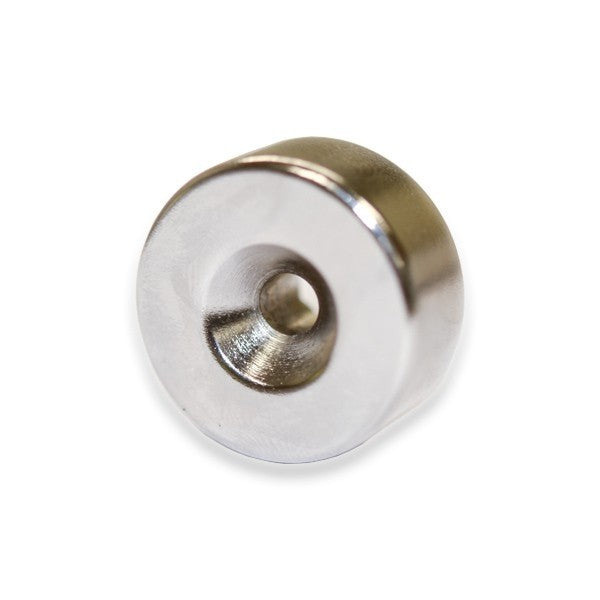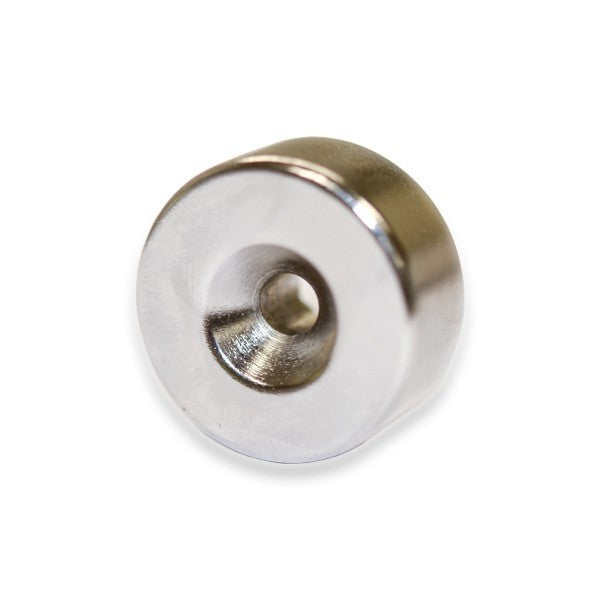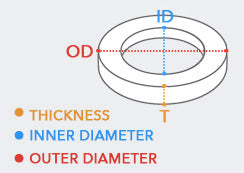Neodymium Ring Magnet - 13mm (OD) x 4.5mm (ID) x 5mm (H) | Countersunk
Product code: 23009A


 Earn 5 points for this product with AMF Magnetics Perks
Earn 5 points for this product with AMF Magnetics Perks
Prices are GST Incl.
Request a Quote for Bulk OrdersAustralia's Leading Supplier
Shipping Worldwide*
30 Day Returns
Same Day Dispatch*

Magnetic Product Description:
This rare earth ring magnet has an outside diameter of 13mm, an inside diameter of 4.5mm and a thickness of 5mm. It has a pull force of 3.5 kg. It is identified by the AMF magnet part number 23009A.
Uses for our rare earth ring magnets:
Neodymium Ring-shaped magnets, due to the hole, have less mass than their disc-shaped cousins and this results in a considerable reduction of magnetic field strength. However, distinct advantages arise from the unique Ring shape that makes them highly valued and particularly suitable in a range of manufacturing and design applications, especially where highly technical and extremely accurate measuring equipment is involved. The sensitivity and accuracy of magnets to detect electromagnetic impulses has been greatly amplified with the introduction of Neodymium magnetic material. For this reason, technologies like sound recording and playback equipment have become much smaller and perform to a much higher standard than pre-neodymium sound equipment. Microphones, speakers and digital recording appliances are enhanced by the inclusion of Neodymium ring magnets into modern sound studio equipment. Neodymium magnetic material has been at the forefront of technological advancement for many decades now. Neodymium Rings are major components in switches, gauges, sensors, backup systems and other types of measuring equipment where accuracy and reliability are crucial. As their power is permanent and unreliant on mains or battery power to operate, they are regarded in many fields as highly reliable and as the safest way to operate and monitor apparatus where conditions and situations can become catastrophic if systems fail. Commercial aircraft have many devices that rely on small, powerful and reliable Neodymium Ring magnets to perform safely.
No FAQ available

NB: Ranges are indicative for product category, please check individual products for specic values within that range.



The most common coating for Neodymium magnets is Nickel + Copper + Nickel (Ni + Cu + Ni). This coating offers the magnet relatively good protection from corrosion and passive applications. If the magnet will be exposed to moisture or liquid then consider the use of an organic coating such as Epoxy. A hard wearing coating, Epoxy is suited to applications where the magnet will come under some friction or knocking.

Magnets are readily available in Blocks, Discs, Cylinders & Rings. AMF Magnetics specializes in the supply of short-run prototype magnets including Arc Segments, various magnetic orientations etc. If you need a magnet size that we don't carry in stock, submit a Design-a-Magnet enquiry for a quote on your custom magnet design.

Neodymium magnets are offered in several different grades. The first section N30-54 has an operating temperature of up to 80 degrees. Most of our stock only goes up to N38. The second section, denoted with the "M" prefix after the grade has an operating temperature 100 degrees. After this the grades are "H", "SH", "UH" & "EH". In order for the magnet to withstand a higher operating temperature, during production more of the raw material PrNd is incorporated as these elements have a naturally occurring resistance to high temperatures.

Magnetic Product Description:
This rare earth ring magnet has an outside diameter of 13mm, an inside diameter of 4.5mm and a thickness of 5mm. It has a pull force of 3.5 kg. It is identified by the AMF magnet part number 23009A.
Uses for our rare earth ring magnets:
Neodymium Ring-shaped magnets, due to the hole, have less mass than their disc-shaped cousins and this results in a considerable reduction of magnetic field strength. However, distinct advantages arise from the unique Ring shape that makes them highly valued and particularly suitable in a range of manufacturing and design applications, especially where highly technical and extremely accurate measuring equipment is involved. The sensitivity and accuracy of magnets to detect electromagnetic impulses has been greatly amplified with the introduction of Neodymium magnetic material. For this reason, technologies like sound recording and playback equipment have become much smaller and perform to a much higher standard than pre-neodymium sound equipment. Microphones, speakers and digital recording appliances are enhanced by the inclusion of Neodymium ring magnets into modern sound studio equipment. Neodymium magnetic material has been at the forefront of technological advancement for many decades now. Neodymium Rings are major components in switches, gauges, sensors, backup systems and other types of measuring equipment where accuracy and reliability are crucial. As their power is permanent and unreliant on mains or battery power to operate, they are regarded in many fields as highly reliable and as the safest way to operate and monitor apparatus where conditions and situations can become catastrophic if systems fail. Commercial aircraft have many devices that rely on small, powerful and reliable Neodymium Ring magnets to perform safely.
No FAQ available

NB: Ranges are indicative for product category, please check individual products for specic values within that range.



The most common coating for Neodymium magnets is Nickel + Copper + Nickel (Ni + Cu + Ni). This coating offers the magnet relatively good protection from corrosion and passive applications. If the magnet will be exposed to moisture or liquid then consider the use of an organic coating such as Epoxy. A hard wearing coating, Epoxy is suited to applications where the magnet will come under some friction or knocking.

Magnets are readily available in Blocks, Discs, Cylinders & Rings. AMF Magnetics specializes in the supply of short-run prototype magnets including Arc Segments, various magnetic orientations etc. If you need a magnet size that we don't carry in stock, submit a Design-a-Magnet enquiry for a quote on your custom magnet design.

Neodymium magnets are offered in several different grades. The first section N30-54 has an operating temperature of up to 80 degrees. Most of our stock only goes up to N38. The second section, denoted with the "M" prefix after the grade has an operating temperature 100 degrees. After this the grades are "H", "SH", "UH" & "EH". In order for the magnet to withstand a higher operating temperature, during production more of the raw material PrNd is incorporated as these elements have a naturally occurring resistance to high temperatures.






